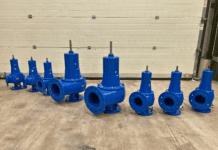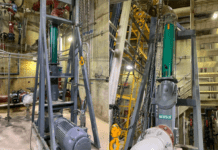Pump manufacturer Seepex discusses the selection of pumps to handle wastewater flocculants, and outlines why progressive cavity pumps are a better choice than their centrifugal counterparts, in this kind of application.

When it comes to specifying a pump, the most important criteria is that it should be fit for purpose. Choosing unwisely can obviously lead to problems like unnecessary downtime or energy consumption, wear, exrtra maintenance call-outs and so on.
The pump specifier will weigh up factors such as the viscosity of the product being conveyed, the desired flow rate, and the operating temperature.
Not all pump technologies are equal in these respects. Some are better at handling low viscosity, while others work well for highly viscous and high solids content products. Shear-sensitive media, for example, require a pump with low shear action.
In wastewater treatment processes, chemical agents are used to thicken sludge by encouraging suspended fine particles to aggregate into larger groups of solid material through a process called flocculation. These flocculants are often extremely viscous and shear-sensitive once hydrated.
Selecting the wrong pump in this case might have consequences for the metering accuracy, or the efficiency of the thickening process.
A water company was using two multi-stage vertical centrifugal pumps to handle a polyelectrolyte flocculant, transferring it from a ‘make-up’ tank – where the powdered polymer was mixed with water – to a daily service tank.
Build-up around the volute casing and impellers in the pumps severely affected the flow which required the pumps to be dismantled and cleaned – a process which took 2-3 hours per pump. It also meant the pumps had to be replaced every six months.
Shear madness
Centrifugal pumps have certain weaknesses when it comes to transferring viscous media, given the effect such materials can have on the impeller, and the high levels of horsepower required to maintain an adequate flow rate.
Their pumping action also generates high shear, which is a liability when it comes to handling shear-sensitive products.
In this application progressive cavity (PC) pumps provided a replacement solution, in this case products from Seepex’s BW range.
Progressive cavity pumps have a low shear pumping action. Their flow rate is directly related to pump speed and they exhibit minimal pulsation, which minimises mechanical stress and product shear damage.
Also, in a PC pump the stator is cleaned by the action of the rotor, which avoids product build-up and the resultant blockages that would otherwise affect pump performance.
The new PC pumps have not suffered from blockages, used any spare parts or required maintenance since they were installed in 2018. In other words, a cost-saving intervention.







